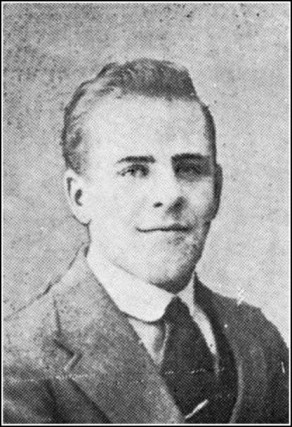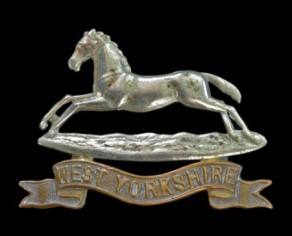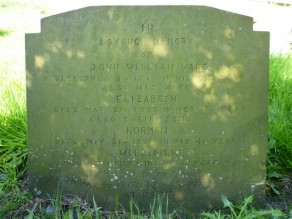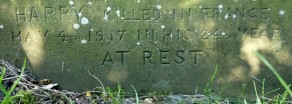Main CPGW Record
Surname: WADE
Forename(s): Harry
Place of Birth: Silsden, Yorkshire
Service No: 26974
Rank: Private
Regiment / Corps / Service: Prince of Wales’s Own (West Yorkshire Regiment)
Battalion / Unit: 21st (Service) Battalion. (Wool Textile Pioneers)
Division: 4th Division
Age: 23
Date of Death: 1917-05-04
Awards: ---
CWGC Grave / Memorial Reference: IV. D. 34.
CWGC Cemetery: DUISANS BRITISH CEMETERY, ETRUN
CWGC Memorial: ---
Non-CWGC Burial: ---
Local War Memorial: SILSDEN, YORKSHIRE
Additional Information:
Harry Wade (born 9 August 1893) was the son of John William and Elizabeth Wade, née Hartley. John was born at Silsden, Yorkshire and Elizabeth at Liverpool, Lancashire. Elizabeth's father, William Pickles Hartley, was born at Brunthwaite near Silsden. Harry's sister, Alice, was married to Private Harry Barrett (65102) (q.v.).
1901 Silsden, Yorkshire Census: 4, South View Terrace - Harry Wade, aged 7 years, born Silsden, son of John W. and Elizabeth Wade.
1911 Silsden, Yorkshire Census: 4, South View Terrace - Harry Wade, aged 17 years, born Silsden, son of John William and Elizabeth Wade.
British Army WW1 Medal Rolls Index Cards: Pte Harry Wade, 26974, W. York. R. D. of W. 4.5.17.
British Army WW1 Medal and Award Rolls: Pte Harry Wade, 26974, 21st W. York. R. Died of Wounds 4.5.17.
Army Registers of Soldiers' Effects: Pte Harry Wade, 26974, 21st (S) Bn W. York. Date and Place of Death: 4.5.17. No.8 C.C.S. To whom Authorised/Amount Authorised: Father and Legatee - John W. £8 5s. 4d.
Data Source: Craven’s Part in the Great War - original CPGW book entry
View Entry in CPGW BookEntry in West Yorkshire Pioneer Illustrated War Record:
WADE, Harry, aged 23, West Yorkshire Regiment, son of Mr. and Mrs. J.W. Wade, 4, South Villa Terrace, [Silsden], died of wounds France.
---
Click the thumbnail below to view a larger image.

Private Harry WADE

Regiment / Corps / Service Badge: Prince of Wales’s Own (West Yorkshire Regiment)

Divisional Sign / Service Insignia: 4th Division
Data from Soldiers Died in the Great War 1914 - 1919 Records
Soldiers Died Data for Soldier Records
Surname: WADE
Forename(s): Harry
Born: Silsden, Yorks
Residence:
Enlisted: Silsden, Yorks
Number: 26974
Rank: Private
Regiment: Prince of Wales's Own (West Yorkshire Regiment)
Battalion: 21st Battalion
Decorations:
Died Date: 04/05/17
Died How: Died of wounds
Theatre of War: France & Flanders
Notes:
Data from Commonwealth War Graves Commission Records
CWGC Data for Soldier Records
Surname: WADE
Forename(s): Harry
Country of Service: United Kingdom
Service Number: 26974
Rank: Private
Regiment: West Yorkshire Regiment (Prince of Wales's Own)
Unit: 21st Bn.
Age: 23
Awards:
Died Date: 04/05/1917
Additional Information: Son of John and Elizabeth Wade, of 14, Norton St., Silsden, Keighley. (CWGC Headstone Personal Inscription: TO BE WITH CHRIST WHICH IS FAR BETTER)
View Additional Text
View Additional Text For Soldier Records
England & Wales, National Probate Calendar (Index of Wills and Administrations), 1858-1966
1917
WADE Harry of South View-terrace Silsden Yorkshire private H.M. Army died 4 May 1917 in France Administration London 2 August to John William Wade boot factor. Effects £96 11s. 1d.
View Craven Herald Articles
View Craven Herald Articles

11 May 1917
NUMEROUS SILSDEN CASUALITIES
A heavy list of Silsden casualties has come through during the past few days, chiefly concerning men who are serving in the West Riding Regiment.
Pte. Harry Wade, of the West Yorkshire Regiment, and son of Mr. and Mrs. J. W. Wade of 4 South View Terrace, Silsden, has been wounded in both legs and arm. Information has been received to that effect from Lieut. T. Pratt, who, in a letter states:– “I deeply regret to inform you that your son was wounded on May 4th by a shell which injured both legs and left arm. He bore his wounds with great fortitude, and was quickly got away to the dressing station, and then to hospital. I do hope that he will soon recover. He was quite conscious, so I am hoping that the shock will not retard his recovery. He was right back in camp when it happened, and it was a great pity that he should have been wounded when he ran so small a risk. I am exceedingly sorry to lose him, for he and his friend, Lance-Corporal C.T. Green (of Silsden) who was wounded some time ago, were amongst my best and most reliable men. I am afraid I shall be unable to furnish you with particulars as to his progress, because once in hospital all touch with him is officially lost, unless he can himself inform us.”
Pte. Wade is 23 years of age, and enlisted a year ago last February. He went to France in June last. Before joining the Colours he was employed by his late father as a boot and shoemaker in Kirkgate, Silsden. He was a member of the Silsden Conservative Club, and also connected with the Silsden Parish Church.
18 May 1917
WADE – Died of wounds received in action on May 4th, 1917, Pte. Harry Wade, West Yorkshire Regiment, son of Mr. and Mrs. J. W. Wade, 4 South View Terrace, Silsden, aged 23 years.
18 May 1917
SILSDEN – PRIVATE HARRY WADE DIES OF WOUNDS
Private Harry Wade, of the West Yorkshire Regiment, son of Mr. and Mrs. J. W. Wade, 4, South View Terrace, Silsden, who was reported in our last issue as having been seriously wounded in both legs and left arm, has died in hospital. News to this effect was received by telegram on Friday afternoon last.
Lieut. T. Pratt, in a letter to the deceased soldier’s parents, also states:– “It is with deep regret that I have to inform you that official news has been received of the death of your son. I am unable to give you the name of the place he died at, but I expect the hospital authorities will let you know. I am extremely sorry that he has succumbed, for as I said in my previous letter to you, I expected to hear of his recovery despite the serious nature of his wounds. I am grieved at the loss to you of such a fine son, and myself of so good a soldier. He was always so solid and dependable, even in the worst of times, so cheery in his outlook and obliging in any work given to do. The men will feel his loss very keenly, for he was of a type that it will be extremely difficult to replace. Please accept my heartfelt sympathy in your sad bereavement.”
Letters of sympathy have also been received from Sergt. Howarth and Pte. Fred W. Helliwell of the same company, who pay a splendid tribute to Pte. Wade’s efficiency, comradeship and popularity amongst them.
15 June 1917
IN MEMORY OF SEVEN SILSDEN FALLEN HEROES
There was a large congregation at the Parish Church on Sunday morning last, when a service was held in memory of seven young men from Silsden who have recently paid the great sacrifice for King and Country.
The service was conducted by the Vicar (Rev. E. E. Peters, M.A.,) who said they were met that morning, when all nature seemed to speak of joy and gladness, under very solemn and sad circumstances to pay their tribute of respect and affection to the memory of seven gallant men who had given their lives for their country. They were:– Private Fred Hardy, Private Edgar Raw, Private Harry Wade, Private William Burton, Private Willie Saddington, Private John William Baldwin, and Private Charles Henry Gill.
By their presence and by taking part in that service, they gave some expression of the heartfelt sympathy which they felt with the sorrowing relatives.
Private Fred Hardy had not been resident a great many years in Silsden, but he had gained many friends by reason of his cheerful disposition and his pleasant and amiable manners. When the call came he left his wife and his happy and comfortable home to go forth in order to do his duty. They knew how he was wounded, brought to a Casualty Clearing Station, and how for some days there was terrible anxiety as to how the balance would turn. During that time he either wrote himself, or dictated to the good and sympathetic chaplain, most brave and cheerful letters in which he thought of his wife, not at all of himself. He derived great comfort from the consolation of religion, and the chaplain was able to write to his wife and assure her how he died in the faith and fear of Jesus Christ.
Private Edgar Raw was one who gave an early answer when the call first came. He had not the pleasure of knowing him personally, but everyone spoke in the very highest terms of him. He was a most excellent young man, active in religious work, and left behind him a fragrant memory.
He then came to one whose loss had been a peculiarly intimate one to him as well as a personal sorrow, for he knew him well, and like everyone else who knew him, he had a great regard for him. He referred to Private Harry Wade, a young man of great promise and blameless character, a true simple-hearted Christian and loyal Churchman, and a regular communicant to whom he had had the great privilege of administering on more than one occasion since he joined the Army the Holy Sacrament. He was a young man, home loving and home keeping; yet, one who felt it his duty to volunteer to defend his country. Although he had no taste for military life, he nevertheless made a thoroughly good soldier, and one of whom his officer spoke in the very highest terms. His officer said he showed great capability, was always reliable and trustworthy, and one whom he could chose to do important work and knew it would be carried out well. Now he had gone to the home above and left them a very heavy loss indeed.
Private William Burton, who was probably not known to a great many of them, was held in high esteem by those who knew him. He was the gardener at Moorfield, and a man who was thoroughly efficient in his work and took a great delight in it. He, too, was very comfortable in his home with his wife and two children, and had gained the confidence and esteem of his employer. He and three other men were killed going to the trenches by a German shell.
Then he came to one who was well known to all of them – Private Willie Saddington – a young man who was brought up in their Sunday School. He had the distinction, as was generally known, of being one of the five soldiers in Silsden who, at mobilisation, was called up to the Colours at the very beginning of the war. He believed his father was also one of the original five. He had honourable military traditions in his family, and since the war broke out – he was a Territorial, as they knew – he at once volunteered for active service. He was kept back in England for some time on account of being a member of a military band, and at last he went out and had not been long at the Front before he fell doing his duty honourably and gallantly.
Private John Wm. Baldwin was a man much older than those of whom he had spoken. He was a soldier of that grand Army – the old original regular Army. He had served his country in South Africa, served his time in the reserves; a man time expired when the war broke out, and well above age, but still he volunteered to join the Colours again. He was one of those who during the first terrible months of the war maintained our cause against desperate odds. He was wounded at Hill 60 of bloody memory, the scene last week of our great and glorious victory. He never recovered entirely from his wounds, his health having been grievously affected, and he died at the military hospital at Derby, where he had gained the affection of the staff. He was laid to rest in that Parish Churchyard with military honours in the presence of a large and sympathetic congregation.
It was only the previous week that they heard of the death of Private Charles Henry Gill, one whom the stern necessity of cruel war had made into a soldier. He was a young man of retiring disposition, reserved in his manners to the general public, but one full of family affection, and devoted to his home. He had fallen a victim to the monster, called into being by the Prussian lust of conquest.
He wished to speak of three more of their young men who were in a somewhat different category to those he had already mentioned. He hoped they would not have to mourn them as gone, and prayed that good news might come concerning them. They had all been reported missing:– Sergeant Charles W. Newns, Private Norman Phillip, and Private Jack Riley.
They were all intimately connected with that place of worship, having been taught in their Sunday School. Sergeant Newns was one of the most promising young men they had. He was a splendid young man, a good Sunday School teacher, and a gymnast and athlete. He naturally made a very fine soldier and gained the highest testimony from his officers and also from the men he commanded. The last they had heard of him was that he was seen risking his life for a wounded man. They prayed that it might be the will of Almighty God to restore those men to them, as they could ill afford to lose them. He wished on his own behalf, and on behalf of all of those present, to express deep sympathy with those in great sorrow and affliction. It was hard to express in anything like adequate terms what they felt. They all realised that the inequality of sacrifice was one of the sad things of their life – that some had to sacrifice so much while others, whether they were willing or unwilling, were not called upon to make sacrifices of like character. But he assured them that they appreciated in the most complete manner the offerings of their sons and the husbands and of those so near and dear to them, which had been made in the cause of righteousness and truth.
During the service the hymns, ‘The saints on earth and those above’, ‘On the resurrection morning’, and ‘O God our help in ages past’, were sung.
There was a company of Girl Guides present at the service, in charge of the vicar’s wife.
The bells were also muffled as a token of respect to the fallen.
View West Yorkshire Pioneer Articles
View West Yorkshire Pioneer Articles

13 April 1917
SILSDEN – THANKS FOR PARCELS
Letters acknowledging the receipt of parcels sent out by the Girls’ Friendly Society on behalf of the members of the congregation of the Silsden Parish Church, to local soldiers associated with the church, have been received from the following:– Lieut. Arthur Driver, Lieut. H. Longbottom, Pte. J.H. Riley, Pte. Wm. Bradley, Pte. Thos Tillotson, Pte. Ernest Botomley, Pte. S. Bancroft, Pte. E.G. Tillotson, Pte. Duncan Wade, Pte. Harry Wade, Pte. H. Green, and Pte. H. Smith.
11 May 1917
SILSDEN’S HEAVY CASUALTY LIST
News was received on Tuesday last that Private Harry Wade, of the West Yorkshire Regiment, son of Mr. and Mrs. J. W. Wade, of 4, South View Terrace, Silsden, had been wounded in both legs and also the left arm. In a letter to his parents Lieutenant T. Pratt states:– “I deeply regret to inform you that your son was wounded on May 4th by a shell which injured both his legs and left arm. He bore his wounds with great fortitude, and was quickly got away to the dressing station, and then to hospital. I do hope that he will soon recover. He was quite conscious, and so I am hoping that the shock will not retard his recovery. He was right back in camp when it happened, and it was a great pity that he should have been wounded when he ran so small a risk. I am exceedingly sorry to lose him, for he and his friend Lance-Corporal Green (another Silsden soldier), who was wounded some time ago, were amongst my best and most reliable men. I am afraid I shall be unable to furnish you with particulars as to his progress, as once in hospital all touch with him is officially lost, unless he can himself inform us.” Private Wade, who is 23 years of age, enlisted a year ago last February, and went out to France last June. Prior to enlisting, he was in the employ of his father, who carries on business as a boot and shoe dealer in Kirkgate, Silsden. He was a member of the Silsden Conservative Club, and was connected with the Silsden Parish Church.
18 May 1917
WADE – Died of wounds in France, Private Harry Wade, of the West Yorkshire Regiment, son of Mr. and Mrs. J.W. Wade, of 4, South View Terrace, Silsden, aged 23.
18 May 1917
SILSDEN SOLDIER DIES OF WOUNDS
Private Harry Wade, of the West Yorkshire Regiment, son of Mr. and Mrs. J.W. Wade, of 4, South View Terrace, Silsden, who was reported in our last week’s issue as having been seriously wounded in both legs and left arm, has died in hospital. News was received to this effect by telegram on Friday, afternoon last.
Lieut. T. Pratt, in a letter to the deceased soldier’s parents, states:– “It is with deep regret that I have to inform you that official news has been received of the death of your son. I am unable to give you the name of the place he died at, but I expect the hospital authorities will let you know. I am extremely sorry that he has succumbed, for as I said in my previous letter to you I expected to hear of his recovery despite the serious nature of his wounds. I am grieved at the loss to you of such a fine son, and myself of so good a soldier. He was always so solid and dependable even in the worst of times, so cheery in his outlook and obliging in any work given him to do. The men will feel his loss very keenly, for he was of a type that it will be extremely difficult to replace. Please accept my heartfelt sympathy in your sad bereavement.”
Letters of sympathy have also been received from Sergt. Haworth, and Private Fred W. Helliwell, of the same company, who pay a high tribute to Private Wade’s efficiency, comradeship, and popularity amongst them.
15 June 1917
SILSDEN’S GALLANT HEROES – Memorial Service at the Parish Church
A service in memory of Pte. Fred Hardy, Pte. Edgar Raw, Pte. Harry Wade, Pte. Wm. Burton, Pte. W. Saddington, Pte. John Wm. Baldwin, and Pte. Charles Henry Gill, seven of Silsden’s gallant heroes who have recently paid the great sacrifice for their King and country, was held at the Parish Church on Sunday morning last. There was a large congregation, and the service was conducted by Rev. E. E. Peters (vicar). As the congregation assembled the organist (Mr. Herbert Cooper) played ‘O rest in the Lord,’ and during the service the hymns 'The saints on earth, and those above,' 'On the Resurrection morning,’ and ‘O God our help in ages past’ were sung.
In the course of his sermon, the vicar said they were met on that beautiful June morning when all seemed to speak of joy and gladness, in very solemn and very sad circumstances to the honour and glory of God, and to pay their tribute and respect and affection to the memory of seven gallant men who had given their lives for their country – Fred Hardy, Edgar Raw, Harry Wade, Wm. Burton, Willie Saddington, John Wm. Baldwin, and Charles Henry Gill. They were also by their presence, and by their taking part in that service, giving some expression to the heartfelt sympathy which they felt with their sorrowing relations. Fred Hardy had not been resident a great many years in Silsden, but he had many friends by reason of his cheerful disposition and his pleasant, amiable manners. When the call came he left his wife, and his happy and comfortable home, to go forth to do his duty. They all knew how he was wounded, brought to a casualty clearing station, and how for some days there was terrible anxiety as to how the balance would turn. During that time he either wrote himself, or dictated to the good and sympathetic Chaplain, most brave and cheerful letters in which he thought of his wife and not of himself. He derived great comfort from the consolation of religion, and the chaplain was able to write to his wife an assure her of how he died in the faith and fear of Jesus Christ.
Edgar Raw was one who gave an early answer when the call first came. He had not the pleasure of knowing him personally, but everyone spoke in the very highest terms of him, that he was a most excellent young man, active in religious work, and he left behind him a fragrant memory.
Now they came to one whose loss had been a peculiarly intimate one, to him a personal sorrow, for he knew him very well, and like everyone else who knew him, he had a great regard for him. He referred to Harry Wade, a young man of promise and of blameless character, a true simple-hearted Christian, a loyal churchman, a regular communicant, to whom he had the great privilege of administering on more than one occasion since he joined the army, that Holy Sacrament. He was a young man, home loving, and home keeping, yet one who felt it his duty to volunteer to defend his country. Although he had no tastes for the military life yet he made a thoroughly good soldier, one of whom his officer was able to speak in the very highest terms, one he said who showed his capability. He was always reliable, always trustworthy, and one whom he could choose to do important work, knowing that he would carry it out well. They knew how he had gone to the home above; he had left them, a very heavy loss indeed.
Then there was Wm. Burton who was not known probably to many of them, but those who did know him, had a very high esteem of him. He was a gardener, a man who was thoroughly efficient in his work, and took a very great delight in it. He was very comfortable in his home and happy with his wife and two children. He had gained the confidence and esteem of his employer. He and other three men were killed going to the trenches by a German shell.
Then they came to Willie Saddington, one of their own young men brought up in their Sunday School, and whom they all knew very well. He had the distinction of being one of the five soldiers, who at mobilisation at Silsden, was called up to the colours at the very beginning. He also believed that Pte. Saddington’s father was another of that original five. He had honourable military traditions in his family. He was a Territorial, and as soon as war broke out, he at once volunteered for active service, but he was kept back in England for some time, being a member of the band. At last he went out, and he had not been long at the front when he fell doing his duty honourably and gallantly.
Then they came to John Wm. Baldwin, a man much older than those of whom he had spoken, a soldier of that old original regular army, a man who had served his country in South Africa, who had served his time on the reserve, a man time-expired when war broke out, and well over age, yet he at once volunteered to join the colours again. He was one of those who during those terrible months of the war maintained our cause against desperate odds. He was wounded at Hill 60 of bloody memory, and the scene last week of our great and glorious victory. He never recovered entirely from his wounds, his health was grievously affected, and he died at the hospital at Derby, where he had gained the affection of the staff, and was laid to rest in the Silsden Parish Churchyard with military honours in the presence of a large and sympathetic congregation.
It was only last week that they heard of the death of Charles Henry Gill, one whom the stern necessity of cruel war had made into a soldier. He was a young man of retiring disposition, reserved in his manners to the general public, but one filled with family affection and devoted to his home. He was not robust in health, but he had fallen a victim to the monster called into being by the Prussian lust of conquest.
There were three others he would speak of that morning, who were in a different category, and they hoped they would not have to mourn them as gone from them. They prayed that news might come of them. Three of their men were posted as missing – Sergt. W, Newnes, Pte. N. Phillip, and Pte. Jack Riley – all three intimately connected with that church and brought up in their Sunday School. W. Newnes was one of the most promising young men they had. He was a splendid young man, a choice young man, a Sunday School teacher, gymnastic, and athlete. He naturally made a very fine soldier, and gained the highest testimony from his officers and the men he commanded. The last that was heard of him was that he was seen risking his life for a wounded soldier. They prayed that it might be the will of the Almighty God to restore them back to their families again. They could ill afford to lose them. He wished on his own behalf, and on behalf of all present, to express their deepest sympathy with those there that day in great sorrow and affliction. It was hard to express in anything like adequate terms what they felt, but they all realised the inequality of the sacrifices was one of the sad things all through life, that some had to sacrifice so much, and others whether they were willing or unwilling, were not called upon to make sacrifices of a like character. He assured them that they appreciated in the most complete manner the offerings of their sons, of their husbands, and of those so near and dear to them, which they had made to the common cause of righteousness and truth.
Comment on this Soldier Record
You can leave comments on this soldier record. Please note all comments will be manually approved before they appear on the website.






No comments yet.